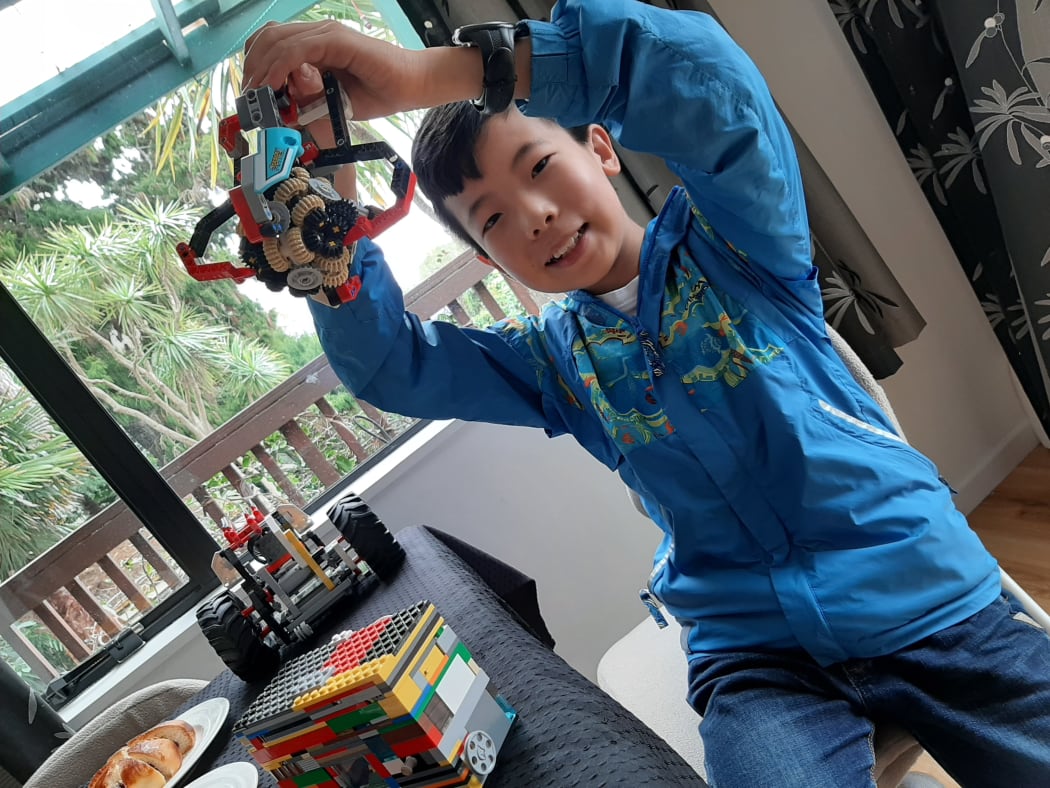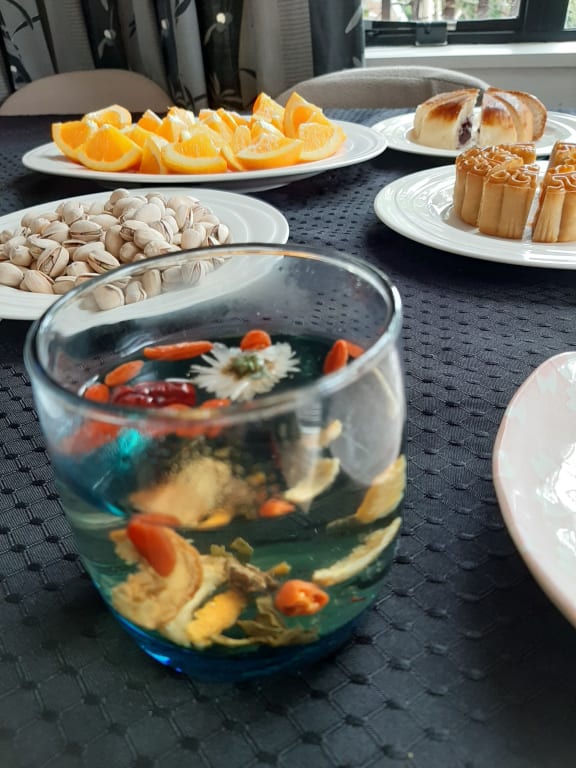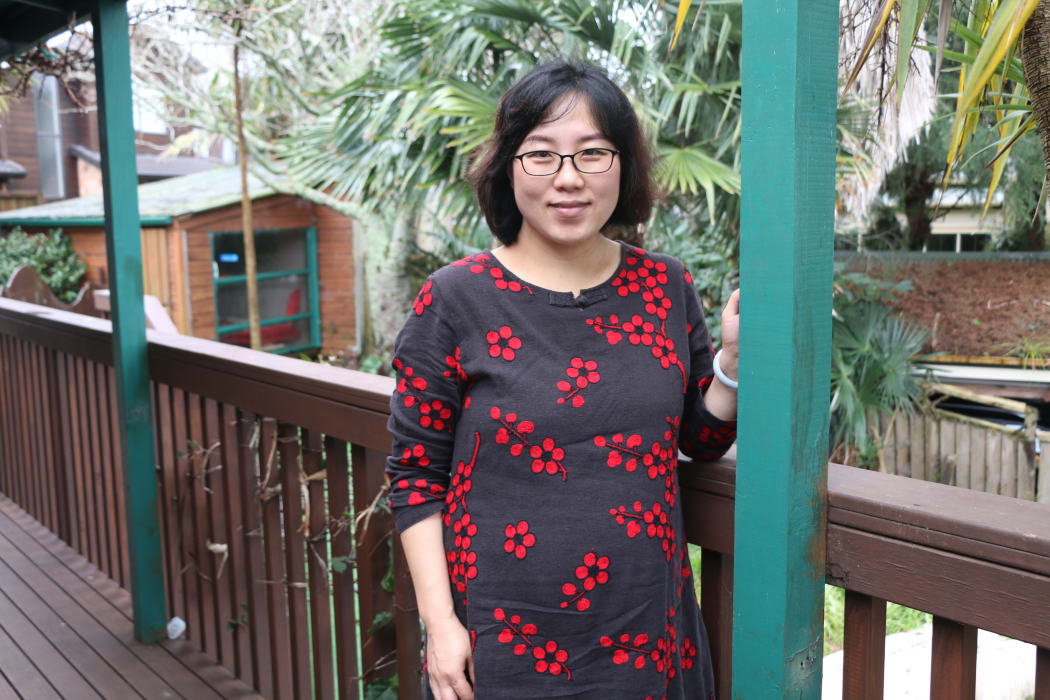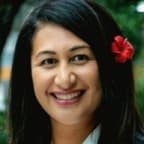With 22-28 September being Chinese language week in Aotearoa, we delve into the life of a migrant parent and child from Beijing. For some, it can be super tough navigating two spaces together – both Chinese and Kiwi English. This is Ling and Dingding’s story.
Beijing born Dingding Ma is like a young Lego master who came to Auckland six years ago.
“I moved here at 5 years old and it was my birthday,” he said. “It was kind of hard.”
This 11-year-old creates amazing creations out of colourful bricks and his face lights up as he describes them to me in English. He started his fascination with Lego at 3 years old.
“This one I made without any instructions.” He holds up all of them.
Subscribe to Voices for free on Apple Podcasts, Spotify, Stitcher and Radio Public or wherever you listen to your podcasts.

Dingding holds up his Lego creations Photo: RNZ / Sara Vui-Talitu
There’s a Lego puzzle box and an impressive hydraulic press machine, among other things. He apologised for not having any batteries inside the latter so he can’t show me how it works on this day.
Dingding attends Gladstone Primary School, a stone’s throw from his house, and he has lots of friends there. But it took a while.
“I went to special English lessons and worked on my English and I got better. I speak Mandarin at home,” he said.
“Chinese is a little bit hard to learn to write, but when you learn it and you go to other countries with Chinese characters on it, it will help you as you will know what it means.”
36-year-old Ling Yang is very proud of her son Dingding and just how far he has come.
“It was hard at first, as he couldn’t play with other kids and so I told him you do what other kids do. If they stand you stand. If they sit you sit. He [then] just ran and played with all the kids.”
What also helped Dingding was the comic television character Mr Bean.
“Before we came to New Zealand, he ended up watching Mr Bean and he’d watch the English version and got the humour, “she said. “Then once he spoke English, he kept on with the humour.”
Ling said she reckons the age of 5 is a good time to start learning English, but also speaking Mandarin at home is important.
Ling grew up in inner Mongolia, an autonomous region in northern China, before ending up in the capital Beijing.
“We have many ancestor group, and they all speak their own language. So, for me, my people in the village back in Mongolia speak their own language.”
Ling speaks Mandarin and said in the south part of China they tend to speak Cantonese more and other minority languages.

Chinese tea and snacks Photo: RNZ / Sara Vui-Talitu
She was lucky she enjoyed learning a bit of English back when she was at high school in China and then she watched English movies like Titanic and Lion King so many times that she memorised the words and how to pronounce them.
“I keep teaching him Mandarin and now we have to prepare an exam and a little gift to encourage him to learn. It is a little harder now for him to learn Chinese, even though he understands some of the reading and writing he still needs practise.”
Migrating to New Zealand was a dream come true for Ling, but it wasn’t easy.
“We had no friends, we have no relatives & everything was new to us, not to mention the language.”
But Ling said that a better education here was a big drawcard.
“Well (it's) been three years that his school report teacher says he has a sense of humour, which is really rare for a Chinese kid,” she said.
“He’s also academic, likes Lego and physics and anything relating to science.”
Ling said Dingding wants to become an aeroplane engineer when he grows up.
"I want to design something that doesn't crash," he said matter-of-factly.
Ling reckons Chinese people who move here need to persevere with fitting in here as it does take a while.
Auckland houses an ethnically diverse population and at the 2013 Census, almost a quarter of Auckland residents identified with an Asian ethnicity - the largest sub-group being Chinese.
Ling and her husband did not know anyone when they first arrived in Auckland, so she looked for different ways to network in the local community.
She joined a local church, attended an English class at a community centre just to meet people, and also joined in with school activities - like attending a PTA meeting, even though she didn’t fully understand Kiwi English at first.
“Kiwi’s are fast talkers,” she said."To Chinese local people in New Zealand I really want to encourage them to be more involved in the community and try to be open and introduce our own culture to them," she said.
“It’s like a bridge of two cultures.”
Ling is looking forward to having her second child here and Dingding will have a sibling soon.
“Once you come through the steps you will find belonging into the community and society and start to make an effort for this country."
"And at the same time you can be an example for other Chinese people because you are working so hard."

Ling Ling Photo: RNZ / Sara Vui-Talitu


